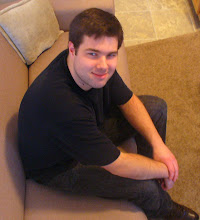October 10th, 2011
With a small notebook and a cup of vending machine coffee in my hands, I entered 205 Varner Hall at the Oakland University campus and took my usual spot four rows back center. My brain hates early morning classes but what helps cope is that it's a course that I hold genuine interest for; a rare thing I'll admit. Professor Terry Herald teaches the history of music that is written for the movies and I'm one of his current students.
My friends didn't believe me at first when I explained that my instructor was a full-time musician who taught music history as a side job. In their minds, the only full-time musicians that exist in the world are notable ones like John Williams and Danny Elfman who often spend entire days composing new material and later receiving studio payment for it. Professor Herald is actually not far off from that. He has written original music for several independent films and television projects. When not employed by a studio, he can often be seen conducting orchestras for various events in Michigan and probably elsewhere too.
Along with the usual movie clips followed by the professor's commentary, all students were scheduled today to receive the results of our second critique paper. At various points throughout the semester, we are assigned to research two movies with original music scores and report our findings in the form of a critique. My paper dealt with two films that contain emotional monologues spoken by heroic characters; James Horner's score for Braveheart and David Arnold's score for Independence Day. In the document, I praised both composers for their ability to convey ideas of location, emotion and deep meaning into their work. The ID4 score in particular held some sentimental value because the end credits theme stayed in my mind for a long time ever since I first saw the film back in 1996. It's a splendid patriotic tune that doubles as a world anthem. Fitting since the film explored the idea of the Fourth of July becoming more than just an American holiday but one for the entire planet. There was a time when I couldn't even hear the words "Independence Day" without being reminded of that terrific theme.
Professor Herald was chatting with some of the other students as he often does when they arrive early. Noticing my entrance, he wrapped up his conversation and addressed me. I expected to hear some early feedback on the assignment but wasn't prepared for the oncoming bombshell.
"Ian..." he began with a proud smile. "I sued David Arnold and Twentieth Century Fox for plagiarizing my work. We reached an out-of-court settlement."
My reaction was comparable to a deer staring at the headlights of a speeding car. But it wasn't a total surprise either. At our very first class meeting, Professor Herald took some time to introduce himself to his students and demonstrate some of his original work not unlike the film music composers we would be studying every week. In 1991, he wrote music for a public television documentary titled "Air Force One: The Planes and the Presidents." After explaining the process of creating and evolving the main theme, the final result was demonstrated before us. You can see and hear it for yourself below.
My immediate reaction was "Wow. This sounds a lot like Independence Day." Now play the next clip (from the ID4 score) at the 6:32 mark. What do you think?
There are probably many more examples that can be found with deeper digging, but that's the most obvious familiarity. According to Professor Herald, the temp track and at least five melodies were directly lifted from the Air Force One documentary without permission.
I didn't bring those reactionary thoughts to my teacher's attention because coincidences in sound and structure happen everywhere in film scoring. There's even a chapter in our assigned textbook "Film Music and Everything Else" that covers the topic of originality. Author Charles Bernstein points out that all composers have the same eight notes to play with and that can make the quest for originality torturous. Yet lawsuits accounting for cases of accused plagiarism remain seldom. Kind of amazing when all things are considered.
Since small talk with the teacher after class had become a habit, I had originally planned to joke that he probably could have easily written Independence Day and made a fortune. If I had only known how close to reality that was, some embarrassment could have been saved. If all the learned details of the controversy are true, that means I had complimented a composer that my teacher had good reason to feel animosity towards. Fortunately though, Professor Herald is a good natured man and didn't hold it against me. I was still awarded a perfect score on that critique paper. Just to be safe, I asked if there were any other lawsuits I should know about before writing future assignments. Then we shared a good laugh.
The extent of the merit behind the David Arnold lawsuit will be pondered in my brain for many years to come. For now though, I can enjoy the amusing knowledge that the original Independence Day composer is my newest friend.
.


Wow. Great story.
ReplyDeleteAnd that ID4 score was a total rip-off! Tempo and everything. Sounds nearly identical.